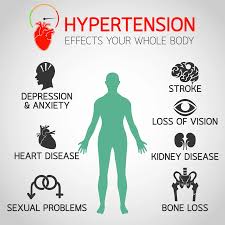+918048067084

This is your website preview.
Currently it only shows your basic business info. Start adding relevant business details such as description, images and products or services to gain your customers attention by using Boost 360 android app / iOS App / web portal.
Description
What is hypertension? High blood pressure is a common condition that affects the body's arteries. It's also called hypertension. If you have high blood pressure, the force of the blood pushing against the artery walls is consistently too high. The heart has to work harder to pump blood. Blood pressure is measured in millimeters of mercury (mm Hg). In general, hypertension is a blood pressure reading of 130/80 millimeters of mercury (mm Hg) or higher. The American College of Cardiology and the American Heart Association divide blood pressure into four general categories. Ideal blood pressure is categorized as normal. Normal blood pressure. Blood pressure is lower than 120/80 mm Hg. Elevated blood pressure. The top number ranges from 120 to 129 mm Hg and the bottom number is below, not above, 80 mm Hg. Stage 1 hypertension. The top number ranges from 130 to 139 mm Hg or the bottom number is between 80 and 89 mm Hg. Stage 2 hypertension. The top number is 140 mm Hg or higher or the bottom number is 90 mm Hg or higher. Blood pressure higher than 180/120 mm Hg is considered a hypertensive emergency or crisis. Seek emergency medical help for anyone with these blood pressure numbers. Untreated, high blood pressure increases the risk of heart attack, stroke and other serious health problems. It's important to have your blood pressure checked at least every two years starting at age 18. Some people need more-frequent checks. Healthy lifestyle habits —such as not smoking, exercising and eating well — can help prevent and treat high blood pressure. Some people need medicine to treat high blood pressure. Symptoms and Causes What are the signs and symptoms of high blood pressure? Usually, high blood pressure causes no signs or symptoms. That’s why healthcare providers call it a “silent killer.” You could have high blood pressure for years and not know it. In fact, the World Health Organization estimates that 46% of adults with hypertension don’t know they have it. When your blood pressure is 180/120 mmHg or higher, you may experience symptoms like headaches, heart palpitations or nosebleeds. Blood pressure this high is a hypertensive crisis that requires immediate medical care. What are the types of high blood pressure? Your provider will diagnose you with one of two types of high blood pressure: Primary hypertension. Causes of this more common type of high blood pressure (about 90% of all adult cases in the U.S.) include aging and lifestyle factors like not getting enough exercise. Secondary hypertension. Causes of this type of high blood pressure include different medical conditions or a medication you’re taking. Primary and secondary high blood pressure (hypertension) can co-exist. For example, a new secondary cause can make blood pressure that’s already high get even higher. You might also hear about high blood pressure that comes or goes in certain situations. These hypertension types are: White coat hypertension: Your BP is normal at home but elevated in a healthcare setting. Masked hypertension: Your BP is normal in a healthcare setting but elevated at home. Sustained hypertension: Your BP is elevated in healthcare settings and at home. Nocturnal hypertension: Your BP goes up when you sleep. What causes hypertension? Primary hypertension doesn’t have a single, clear cause. Usually, many factors come together to cause it. Common causes include: Unhealthy eating patterns (including a diet high in sodium). Lack of physical activity. High consumption of beverages containing alcohol. Secondary hypertension has at least one distinct cause that healthcare providers can identify. Common causes of secondary hypertension include: Certain medications, including immunosuppressants, NSAIDs and oral contraceptives (the pill). Kidney disease. Obstructive sleep apnea. Primary aldosteronism (Conn’s syndrome). Recreational drug use (including amphetamines and cocaine). Renal vascular diseases, which are conditions that affect blood flow in your kidneys’ arteries and veins. Renal artery stenosis is a common example. Tobacco use (including smoking, vaping and using smokeless tobacco). Is high blood pressure genetic? Researchers believe genes play a role in high blood pressure. If one or more of your close biological family members have high blood pressure, you have an increased risk of developing it, too. What are the risk factors for high blood pressure? Risk factors that make you more likely to have high blood pressure include: Having biological family members with high blood pressure, cardiovascular disease or diabetes. Being over age 55. Being Black. Having certain medical conditions, including chronic kidney disease, metabolic syndrome, obstructive sleep apnea or thyroid disease. Having overweight or obesity. Not getting enough exercise. Eating foods high in sodium. Smoking or using tobacco products. Drinking too much. What are the complications of this condition? Untreated hypertension may lead to serious health problems including: Coronary artery disease (CAD). Stroke. Heart attack. Peripheral artery disease. Kidney disease and kidney failure. Complications during pregnancy. Eye damage. Vascular dementia. Diagnosis and Tests How is high blood pressure diagnosed? Healthcare providers diagnose high blood pressure by measuring it with an arm cuff. Providers usually measure your blood pressure at annual checkups and other appointments. If you have high blood pressure readings at two or more appointments, your provider may tell you that you have high blood pressure. They’ll talk to you about your medical history and lifestyle to identify possible causes.
Key Specification Hypertension
High Blood Pressure


